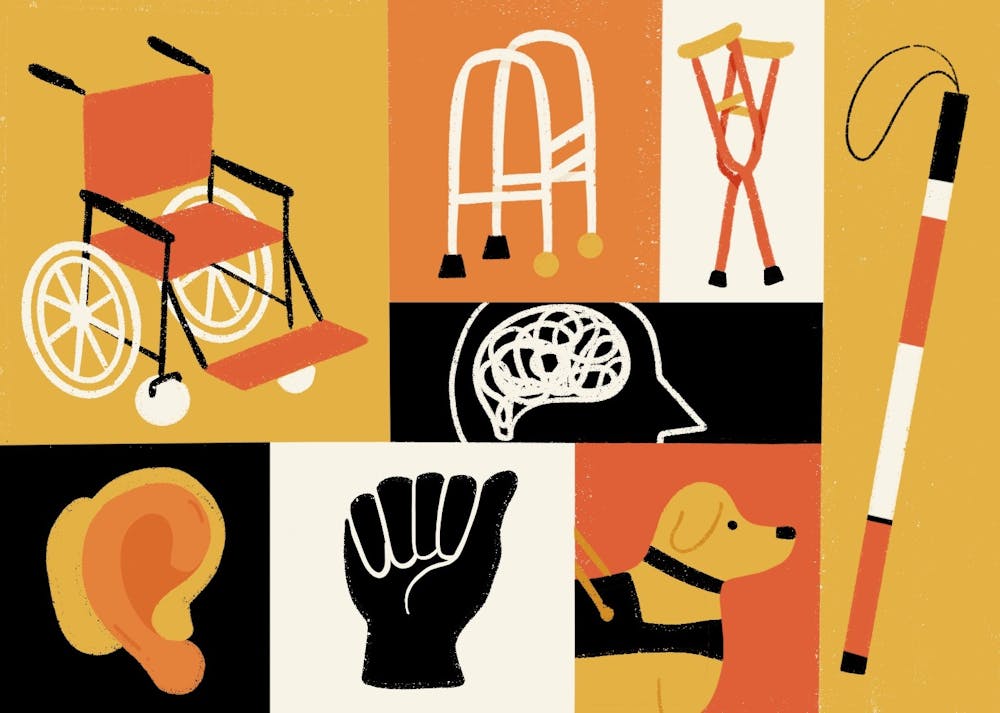As a first-year university student who is neurodivergent, school is a challenge.
But Student Accessibility and Inclusive Learning Services, or SAILS, is available to help any student with a disability get a proper education despite setbacks they can't control.
Even if students are aware of SAILS and its resources, they may not be accepting of accommodations. According to SAILS director Chad Price, about 5% to 6% of the ASU student population registers with SAILS. However, Price estimated about 19% of undergraduate students would potentially qualify for accommodations.
The idea that one isn't "disabled enough" for accommodations, fear of admitting defeat, thinking that one would be restricted by costs and copays or internalized ableism may prevent students from even reaching out.
I was lucky to be pushed to pursue housing accommodations by my psychiatrist, but even then, I didn't know what SAILS was. Many students, however, don't even have that person to push them to pursue accommodations. They have to push themselves to accept both their disability as well as their need for help.
This has a disproportionate effect on low-income people, who are unable to access resources that allow them to be diagnosed and receive accommodations or treatment due to lack of access to insurance or the cost of a copay. According to a study by the National Council for Mental Wellbeing, one in four Americans reported having to make the choice between receiving mental health care or paying for daily necessities.
SAILS, ASU Counseling Services and ASU Health Services provide an opportunity for students at ASU to get access to diagnosis, treatment, accommodation, counseling and more. However, some students with disabilities don't accept or seek out these accommodations because of their own assumptions about what it means to seek help.
"Many students with disabilities, when they come to ASU, just want to blend in and don't want to be identified as different than anyone else," Price said.
Disabled or neurodivergent students may struggle to accept what makes them different because it is painful. It's painful for me to accept that I cannot do what others can.
When I walk into my classes and when I start my homework, I am reminded of my limitations. Bipolar disorder makes me non-functional for days at a time. I can't get out of bed or even open my laptop. I don't have the same endurance or stamina. I have to take my Adderall to even begin to focus on any given assignment. When you are stuck in that hole, you can only see the things that you cannot do, you cannot see that help is all around you.
I lived for 17 years unaware that I was neurodivergent, bipolar and experiencing panic attacks almost daily. To me, my thoughts and my feelings were my fault. I thought I didn't need help.
This is something a lot of disabled or neurodivergent students experience: internalized ableism. We expect poor treatment or lack of accessibility because we believe we deserve less respect. In addition, internalized ableism could lead to students forming unhealthy methods to adapt to their disability, or, even worse, to mask it.
"A lot of students are afraid if they go in there it's like admitting defeat, like I wasn't able to get through college like a 'normal student,'" said Jake Bell, a disabled student on the Accessibility Coalition and a senior studying political science. But there's no such thing as a "normal student." It's just some image that we all craft in our minds. It is not a defeat to ask for help.
Price said that SAILS is receiving more attention than it ever has. Even then, SAILS is still not visible to many students. One way to combat this, I believe, is to form educational courses that appear as priority tasks for first-year students similar to EVERFI AlcoholEdu that teach students about the office, the range of disability and the breadth of accessibility accommodations.
"If anyone is having trouble, it's really easy to find someone at the Accessibility Coalition or SAILS and ask them what accommodations are available," Bell said. "You might think that there isn't something that can help you. If you just ask, they can find something even minor that can help you in class."
Connect with your disabled peers and learn about accessibility, if not to better understand disabled students and if not to fight ableism, then to learn that even you may require accessible resources and to learn that they are available.
Students can visit the SAILS website, email SAILS, or call (480) 965-1234 to get in contact with the office. Reach out to the Accessibility Coalition through SunDevilSync to better learn about accessibility and disability on campus.
Reach the columnist at aivailla@asu.edu or follow @SlSSYPHUS on Twitter.
Editor's note: The opinions presented in this column are the author's and do not imply any endorsement from The State Press or its editors.
Want to join the conversation? Send an email to opiniondesk.statepress@gmail.com. Keep letters under 500 words and be sure to include your university affiliation. Anonymity will not be granted.
Like The State Press on Facebook and follow @statepress on Twitter.
Continue supporting student journalism and donate to The State Press today.




